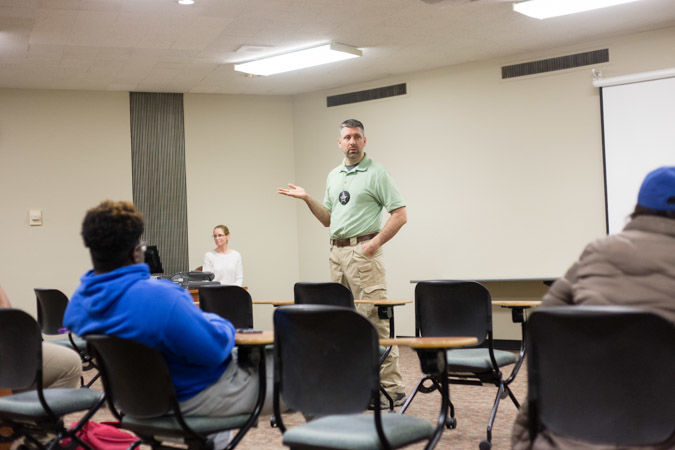Citizens learn investigation tactics
March 8, 2018
DeKALB — Citizen Police Academy participants practiced fingerprinting and learned the science behind crime scene evidence collection during their Wednesday night session.
The course focused on the collection and preservation of evidence at a crime scene. Each week the individuals in the program look into a different area of police work during the 11-week program run by the NIU Campus Police. The program was first offered to the public in the spring 2017 semester, and the current class began Jan. 24.
NIU Police Chief Tom Phillips said in a Feb. 22 interview with the Northern Star the idea for the Citizen Police Academy came to him after what happened in Ferguson, because the incident put a strain on relationships with law enforcement. The program is meant to show community members police are there for them.
“The Citizen Police Academy is a very common thing in police departments,” Phillips said. “This is a way that police try to build relationships with the community and also giving you a better understanding of what our world’s like, but also giving us an understanding of your perspective.”
With hands-on training and presentations, the free training academy gives students and community members the opportunity to better understand the different aspects of police work.
Philips said he wanted the Citizen Police Academy to be unique so, instead of extensive powerpoint presentations there is a very large hands-on component.
Evidence Tech Coordinator Brian Gerken addressed the group while working through an in-depth presentation of evidence collection and preservation.
“It’s called evidence techs rather than crime scene because we don’t just collect stuff from crime scenes,”Gerken said. “We collect evidence that something happened.”
Officers have to take strange routes around areas being investigated so they do not disturb the crime scene and lose potential evidence, Gerken said. They also use search patterns to make sure they don’t miss anything, and the process requires patience when collecting evidence. Officers are also required to take videos and photographs of the area before beginning an investigation.
“Think systematically,” Gerken said. “There’s a lot of different ways you could enter that room, and you’re looking for the microscopic to the large stuff.”
After the presentation students split into two groups; Gerken taught students how to fingerprint and Officer Cindy Zimberoff briefed students on a hypothetical crime scene before giving them the opportunity to practice collecting evidence.
Zimberoff said officers follow a certain protocol if they request entry into a residence and the individual denies their request. “If they tell me ‘no’, and I believe something happened in that room, I tell them they have to come out of that room,” Zimberoff said. ‘We post an officer at the door, the detective or whoever’s assigned to it goes in front of a judge…f they feel there’s merit for you to get in the room, they sign the warrant.”
Graduate student Edwin Esmenda said he joined the academy because he is currently studying evidence and criminal procedure in law school.
Sessions have taught the participants about the Fourth Amendment, medical procedures, traffic stops, defense techniques, dispatch and telecommunications so far, Edmenda said.
“When we get [information] we just say OK, the cop said this, the cop said that, but now we can see how they got it, so now we can visualize it,” Esmenda said.
He said the program brings community awareness to what police officers really do, and he has really enjoyed being a part of the academy.
“We did different scenarios, like we did what to do and what not to do if someone’s getting stabbed or somebody’s getting beaten up,” Esmenda said.
What officers do is much harder than everyone thinks because through news outlets we point out when a suspect is weaponless, but officers have seconds to decide whether to shoot or not Esmenda said.
“Everyone can judge in hindsight but at that particular moment the fear for your life is like for real,” Esmenda said.














